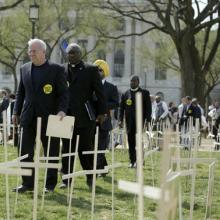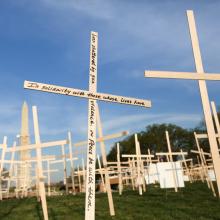Congress
As a kid, the school day revolved around recess. The bell rang, the books closed, and we bolted out of the building and onto the playground. For a few brief minutes anything was possible. Imaginations ran wild, transporting us to far off lands and transforming us into superheroes and sports stars. We cemented friendships and started fights; we formed alliances and enemies. And while our teachers and parents assumed that math, science, reading, and social studies structured our day, in reality our lives were defined by what transpired during recess.
Congress is in recess during the month of August. While many assume they have taken an extended vacation, nothing could be further from the truth. Recess is just as important now as it was when we were kids, but the rules have changed. Here are five things you need to know about the next month.
Our church community in Salt Lake City has been going through a series titled “Love God, Love Neighbor.” We’ve been going through Jesus’ famous response to the question, “What must I do to inherit eternal life?” Jesus of course turns the questions back to the man asking, “What is written in the law?” the man responds by saying, “Love the Lord your God with all your heart, soul, and mind, and love your neighbor as yourself.” It appears the man who asks the question — described as either a lawyer or expert of religious law — does not like Jesus’ response very much and so he asks another question. “And who is my neighbor?”
Jesus’ response to the question is perhaps one of the most well-known parables in the Bible: that of the Good Samaritan. But the question, “Who is my neighbor?” is a question we must still wrestle with today, as distressing and upsetting as it most definitely will be.
Who is my neighbor? If we are to examine the parable of the Good Samaritan it appears that Jesus wants to make it clear that our neighbors are everyone, especially — perhaps even specifically — our enemies. So another way of asking the question is, “Who is my enemy?” When I confront the question on a personal level, I realize that even though my neighbors or enemies are perhaps atypical from the norm, I am still called to love them.
Who are my enemies? For me, it’s simple really. My enemies are politicians, Congress, rich people, Wall Street Bankers, rich Christians, and the most hated form of all: “rich, white, Christian politicians.” I jest, but it’s not too far off.
The month of July stands as an important time for Congress as members of the House and Senate attempt to make decisions about six major U.S. issues. Some vital decisions that need to be agreed upon before next month’s recess involve: immigration reform, student loan debates, budget planning, and fiscal issues. The Washington Post reports:
Significant debates await the House and Senate in the coming weeks over a new budget, a new farm bill, federally-subsidized student loans, several key Obama administration nominees and an overhaul of the nation’s immigration laws, which remains the year’s biggest political fight.
Read more here.
By a 68-32 vote, the Senate just passed S.744, a bipartisan immigration reform bill that people of faith have held up as part of a solution to the United States’ broken immigration system. While it still has to make its way through the House of Representatives, here are the top 10 things that would happen if S. 744 became law:
1. It would create a roadmap to citizenship for aspiring Americans.
Current immigration law has no way forward for immigrants who don’t have the right documents. The Senate bill would open doors for them to become full members of society.
2. It would bring hope to lots of people.
Around 8 million of the 11.4 million aspiring Americans living in the shadows would be able to gain legal status, giving them hope and opportunity. That’s as many people as live in the entire state of New York – a huge impact.
For the first time, the federal government has issued written guidelines for houses of worship that are confronted with a homicidal gunman.
Vice President Joe Biden released the new rules on Tuesday, six months after the school shooting in Newtown, Conn., that left 26 dead, including 20 children.
Beyond seeking shelter and waiting for police to arrive, as many Newtown victims did, the new rules also advise adults in congregations to fight back — as a last resort — in a bid to stop the shooter. The new federal doctrine is “run, hide or fight.”
President Barack Obama is expected to call upon lawmakers and Congress Tuesday as he asks for their support in backing his measures concerning gun safety. In the wake of announcing 21 of 23 tasks completed on the “executive to-do list,” Obama is hoping for funding as conversations about gun safety continue. The Los Angeles Times reports:
Administration officials say there has been progress on several actions taken by Obama under executive authority, including directives to end the freeze on gun violence research and to reduce barriers that keep states from submitting records to the national background system.
Read more here.
General Motors signed the Climate Declaration. The statement is part of a new initiative by businesses for greater action on global warming in Washignton. No specific recommendations are made in the declaration. The Guardian reports:
"We want to be a change agent in the auto industry," Mike Robinson, GM vice-president of sustainability and global regulatory affairs, said in a statement.
Other endorsers of the Climate Declaration include eBay, Ceres, Starbucks, and Unilever.
The short statement, endorsed by GM, leads off: "Tacking climate change is America's greatest economic opportunity of the 21st century (and it's simply the right thing to do)."
Read more here.
President Obama broke his silence to comment on the current hunger strike of over 90 men at Guantanamo Bay. Time reports:
“It’s not sustainable,” President Obama said Tuesday, breaking his silence about the protest against his own government. “I mean, the notion that we’re going to continue to keep over 100 individuals in a no-man’s land in perpetuity.”
Obama repeated a position he has long held: The detention facility needs to be closed, with the prisoners either transferred to third countries if they do not present a threat or to the United States for adjudication. “This is a lingering, you know, problem that is not going to get better,” he said. “It’s going to get worse. It’s going to fester.”
The next steps at Guantanamo Bay are muddled in beaucracy. The President, Congress, and Secretary of Defense all have steps they must take before any real progress can be made.
Read more here.
Clergy from California to Connecticut created a makeshift graveyard symbolizing victims of gun violence on the National Mall on Thursday as they exhorted Congress to pass legislation to limit access to firearms.
Standing in front of 3,300 grave markers — representing the number of people who have died in gun violence since December’s massacre in Newtown, Conn. — more than 25 ministers, rabbis and other religious leaders decried as “idolatrous” a society that values guns more than human life.
“We don’t have a Second Amendment issue,” said the Rev. Matt Crebbin of Newtown Congregational Church. “We have a Second Commandment crisis.
Today, on the National Mall, I stood with fellow faith leaders, including clergy from Newtown, to remember lives lost at Sandy Hook elementary school and the 3,364 gun deaths that have happened since.
We stood in front of a field of crosses, Stars of David, and other grave markers, and it broke my heart to think that each one stood for a life ended too soon. It doesn’t have to be this way. Commonsense steps to reduce gun violence are within our reach. Just today the Senate voted to begin the debate. But there is much work to do. Lawmakers need to hear from you.
This is one of the clearest examples of a stark democratic choice: the old politics of guns or the morality of the common good. The clergy are here today for the common good.
During this Holy Week, Christians around the world turn inward to reflect on the mystery and miracle of the death and resurrection of our Lord, Jesus Christ. Those two surpassing events are more than good enough to occupy the mind and heart of every believer.
But they are not all that Jesus did in these eventful days. As any student of the scriptures will know, Jesus did not go quietly to the cross. Three days before his execution, he stormed the temple and challenged the seat of theocratic power in Jerusalem, condemning the pharisaic elite who "preach, but do not practice" and "tie up heavy burdens, hard to bear, and lay them on the people's shoulders." (Matt. 23:3-4) He accused as hypocrites leaders who make token offerings yet "have neglected the weightier matters of the law: justice and mercy and faithfulness … Inside they are full of greed and self-indulgence." (Matt. 23:23,25)
In his final teaching before the events of Maundy Thursday and Good Friday began, Jesus embraced those who are oppressed and cautioned his disciples that acts of love and mercy are the measure of a heart touched by grace. "For I was hungry and you gave me food, I was thirsty and you gave me drink, I was a stranger and you welcomed me, I was naked and you clothed me, I was sick and you visited me, I was in prison and you came to me … Truly, I say to you, as you did it to one of the least of these my brothers, you did it to me." (Matt. 25:35-40)
In honor of the occasion, Congress will close its doors and lawmakers will head home to be with their constituents for the Easter recess. If inside reports are to be trusted, they will leave Washington "armed with excuses" that explain away the latest fiscal fiasco, and the people will have little to say in reply. I pray it isn't so.
Driven by our moral call to protect each member of our society, people of faith have been outspoken about the need to craft meaningful legislation to reduce gun violence. This week, Mayors Against Illegal Guns released an ad featuring a diverse group of religious leaders, including Sojourners CEO and President Jim Wallis, leaders to demand that Congress make common-sense reforms to our nation’s legislation that is failing to keep us safe.
The faith community continues to speak loudly and clearly about the moral urgency to address this issue. The only question is whether Congress will listen and finally address the epidemic of violence that plagues our nation.
I just spent a wonderful and encouraging weekend with a church leadership team from Reisterstown, Md. I came away filled with hope for this congregation and with admiration for their clergy and lay leaders.
I wish our weak and tiresome political leaders in Washington and state capitals could visit this church in northern Baltimore County and see how mature adults of diverse backgrounds and viewpoints manage to put the congregation first.
They listened, spoke without barbed words and without aggression garbed in niceness.
They voiced their dreams, heard their differences, and then allowed a consensus dream to emerge. They understood the need to move on from yesterday. They were like two healthy parents trying to work a family problem. They seemed to trust each other.
Conflict happens everywhere, from Congress to congregations, from boardrooms to bedrooms. The dysfunction of Congress is just a highly public instance of a typical conflict scenario.
I recently compiled some basics of church conflict. See if you agree with me that this playbook applies broadly.
Church conflicts – which will happen to all clergy and congregations eventually – generally focus on the clergy, just as conflict in any enterprise tends to focus on the top leader. That’s because the underlying issue usually is power – who calls the shots, who can initiate change, who can hold others accountable.
Secondary issues like specific actions, perceived performance and trust get the spotlight, but are surrogates for the power issue. People who want power don’t relish being perceived as wanting power. They prefer being seen as the aggrieved, better performers, more trustworthy, more faithful to ultimate purposes.
Church conflicts usually spring from a small group of antagonists, perhaps even a single person, who start with a conclusion, largely intuitive and emotional, and then search for reasons. Those reasons tend to be moving targets that defy better information. Deal with one reason, and two more take its place.
Antagonists, meanwhile, intimidate others into compliance, or at least silence, by making it clear they will stop at nothing to win.

The U.S. Capitol building at sunset. RNS photo by spleeness via Flickr (http://flic.kr/p/dvwqfk).
WASHINGTON — At a time when the ideals of compromise and collegiality seem like a distant dream in the nation’s capital, an unusually diverse coalition of religious leaders is asking Americans to pray for civility.
“Through daily prayer, we are calling on the ‘better angels of our nature’ needed to sustain our nation and solve problems,” said the Rev. Peg Chemberlin, immediate past president of the National Council of Churches and one of the faith leaders taking part in “18 days of Prayer for the Nation.”
Prayers began Thursday, the first day of the new Congress, and end on Jan. 21, the day of President Obama’s second inauguration.
Faith leaders from left, right and center have signed on, including Episcopal Presiding Bishop Katharine Jefferts Schori, Richard Land of the Southern Baptists’ Ethics, and Religious Liberty Commission and Richard Cizik, president of the New Evangelical Partnership for the Common Good.
The Faith & Politics Institute, a nonpartisan group that nurtures the spiritual life of members of Congress and their staffs and presses political foes toward civil debate, organized the days of prayer and an online “commitment to prayer” page to document participation.
Speaking of the widow’s offering, Jesus says: “Truly, I tell you, this poor widow has put in more than all those who are contributing to the treasury. For all of them have contributed out of their abundance; but she out of her poverty has put in everything she had, all she had to live on.” (Mark 12:41-44)
Today, families across America will gather round tables full of food. They will hold hands and pray. They will give thanks for the blessings that have come to each member over the past year. Some of these families’ tables will be covered with turkeys, stuffing, cranberry sauce, and yams; symbols of abundant blessing. Others will give thanks over Hillshire Farms sliced turkey sandwiches on Wonder bread; symbols of blessing in the midst of hard slog of poverty. Though their tables are bare, their thanks offerings are full of power. For, like the widow’s offering, Jesus reveres the offerings of the poor.
This Thanksgiving, as your family holds hands and give thanks and as your church packs Thanksgiving dinner baskets, and this Christmas season churches prepare gift baskets for those Jesus called “The Least of these” (Matthew 25:40) we at Sojourners ask you to do one more thing: Take five minutes and handwrite a simple letter to your member of Congress.
Three Buddhists, a Hindu, and a “none” will walk into the 113th Congress, and it’s no joke. Rather, it’s a series of “firsts” that reflect the growing religious diversity of the country.
When the new Congress is sworn in next January, Hawaii Democrat Tulsi Gabbard, an Iraq war veteran, will represent the state’s 2nd Congressional District and will become the first Hindu in either chamber on Capitol Hill.
The 31-year-old Gabbard was born in American Samoa to a Catholic father and a Hindu mother, and moved to Hawaii as a child. She follows the Vaishnava branch of Hinduism, which venerates the deity Lord Vishnu and his primary incarnations.
Gabbard takes over the seat held by Rep. Mazie K. Hirono, who won a Senate race on Nov. 6 and will become the first Buddhist to sit in the upper chamber. There were already two other Buddhists in the House of Representatives, both of whom won re-election: Rep. Hank Johnson, a Georgia Democrat, and Rep. Colleen Hanabusa, a fellow Hawaii Democrat.
By the time President Obama walked off the stage at Chicago’s McCormick Place after delivering his acceptance speech early Wednesday morning, pundits already were screaming HERE COMES THE FISCAL CLIFF!
And while it might have been a nice idea to take a collective breath after such a divisive election season before new screeching began, the pundits were not wrong.
Be warned: The Fiscal Cliff approaches. On Jan. 2, 2013, to be exact.
Now, I am many things, but an economist (or even a person remotely comfortable with numbers) is not one of them. So let me explain to those of you who are like me, in the simplest terms possible, what this proverbial cliff is all about.
In the wake of the debt ceiling crisis last summer, Congress and President Obama agreed to enter into negotiations to enact a 10-year deficit reduction package in excess of $1.2 trillion.
If an agreement could not be reached, a mandatory, across-the-board reduction in spending (also known as “sequester” or “sequestration”) would occur. All discretionary and entitlement spending -- with a few exceptions -- would be subject to sequestration....
Under sequestration, the U.S. foreign aid that has made such a tremendous difference in Ethiopia and in the lives of countless millions of desperately poor Africans (and others) is in grave jeopardy.
Congress will become a shade more religiously diverse this January, after Tuesday’s election of the first Hindu representative and first Buddhist senator.
Tulsi Gabbard, a Democrat from Hawaii, will become the first Hindu-American congresswoman, after defeating her Republican rival on Tuesday.
ONE OF THE best things about growing up in the 1970s was Schoolhouse Rock! on Saturday morning TV. The day my high school history class began to study the preamble of the U.S. Constitution, we all broke into song: “We the People ... in Order to form a more perfect Union, establish Justice, insure domestic Tranquility, provide for the common defense, promote the general Welfare ...”
In the ’70s, Americans still believed those words; the general welfare was important to policymakers across the political spectrum. Today, we have a political discourse where the Republican presidential contender disparages the elderly and the unemployed for collecting benefits for which they’d paid into an insurance fund.
And now policymakers are allowing the looming “fiscal cliff” to threaten the U.S. economic recovery from the recent recession. At the end of this year (or a few months later if Congress kicks the can down the road), Congress and the administration must work out a compromise on spending cuts and revenue increases, or the economy will face deep, mandatory federal spending cuts and across-the-board tax hikes. Such deep spending cuts would devastate many programs that aid those most in need. And, in addition to hurting families, spending cuts at this point in the recovery threaten to derail economic growth and job creation.
In order to make sure fewer people need unemployment insurance benefits, Congress needs to run deficits for the next couple years. Economists are in general agreement that what the economy needs now is more fiscal expansion—that is, an agenda that will make investments that could create jobs and pave the way for long-term economic growth. Federal Reserve Chair Ben Bernanke pointed this out in a recent speech: “Fiscal policy, at both the federal and state and local levels, has become an important headwind for the pace of economic growth.”












